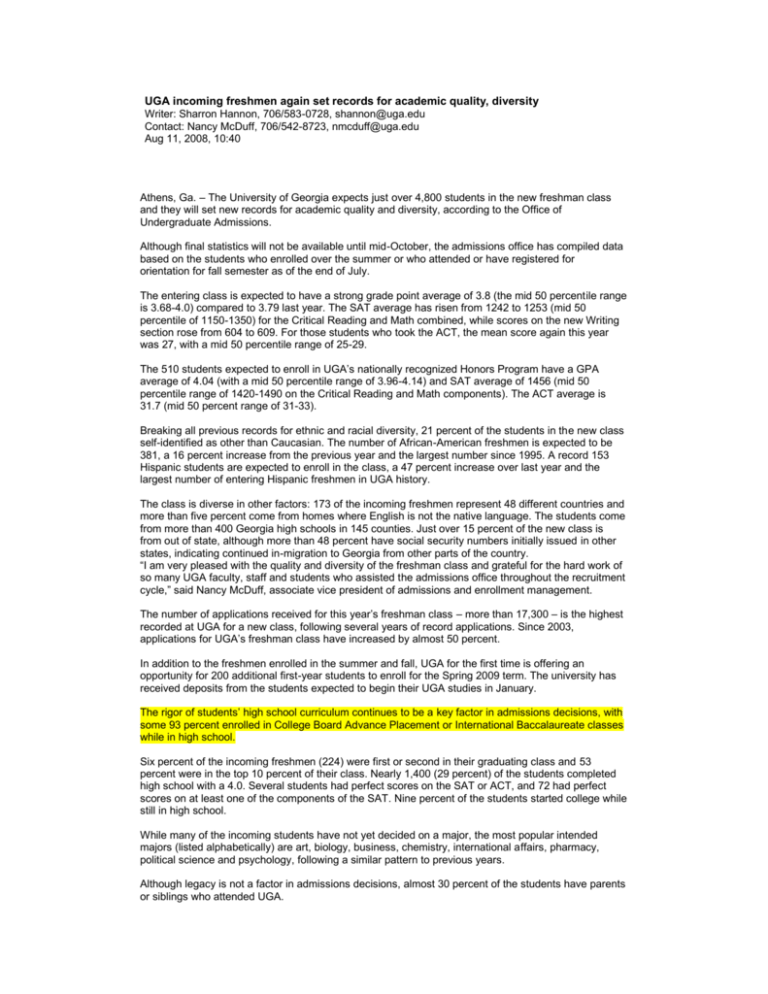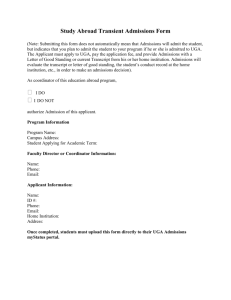Read University of Georgia article on Advance Placement and
advertisement

UGA incoming freshmen again set records for academic quality, diversity Writer: Sharron Hannon, 706/583-0728, shannon@uga.edu Contact: Nancy McDuff, 706/542-8723, nmcduff@uga.edu Aug 11, 2008, 10:40 Athens, Ga. – The University of Georgia expects just over 4,800 students in the new freshman class and they will set new records for academic quality and diversity, according to the Office of Undergraduate Admissions. Although final statistics will not be available until mid-October, the admissions office has compiled data based on the students who enrolled over the summer or who attended or have registered for orientation for fall semester as of the end of July. The entering class is expected to have a strong grade point average of 3.8 (the mid 50 percentile range is 3.68-4.0) compared to 3.79 last year. The SAT average has risen from 1242 to 1253 (mid 50 percentile of 1150-1350) for the Critical Reading and Math combined, while scores on the new Writing section rose from 604 to 609. For those students who took the ACT, the mean score again this year was 27, with a mid 50 percentile range of 25-29. The 510 students expected to enroll in UGA’s nationally recognized Honors Program have a GPA average of 4.04 (with a mid 50 percentile range of 3.96-4.14) and SAT average of 1456 (mid 50 percentile range of 1420-1490 on the Critical Reading and Math components). The ACT average is 31.7 (mid 50 percent range of 31-33). Breaking all previous records for ethnic and racial diversity, 21 percent of the students in the new class self-identified as other than Caucasian. The number of African-American freshmen is expected to be 381, a 16 percent increase from the previous year and the largest number since 1995. A record 153 Hispanic students are expected to enroll in the class, a 47 percent increase over last year and the largest number of entering Hispanic freshmen in UGA history. The class is diverse in other factors: 173 of the incoming freshmen represent 48 different countries and more than five percent come from homes where English is not the native language. The students come from more than 400 Georgia high schools in 145 counties. Just over 15 percent of the new class is from out of state, although more than 48 percent have social security numbers initially issued in other states, indicating continued in-migration to Georgia from other parts of the country. “I am very pleased with the quality and diversity of the freshman class and grateful for the hard work of so many UGA faculty, staff and students who assisted the admissions office throughout the recruitment cycle,” said Nancy McDuff, associate vice president of admissions and enrollment management. The number of applications received for this year’s freshman class – more than 17,300 – is the highest recorded at UGA for a new class, following several years of record applications. Since 2003, applications for UGA’s freshman class have increased by almost 50 percent. In addition to the freshmen enrolled in the summer and fall, UGA for the first time is offering an opportunity for 200 additional first-year students to enroll for the Spring 2009 term. The university has received deposits from the students expected to begin their UGA studies in January. The rigor of students’ high school curriculum continues to be a key factor in admissions decisions, with some 93 percent enrolled in College Board Advance Placement or International Baccalaureate classes while in high school. Six percent of the incoming freshmen (224) were first or second in their graduating class and 53 percent were in the top 10 percent of their class. Nearly 1,400 (29 percent) of the students completed high school with a 4.0. Several students had perfect scores on the SAT or ACT, and 72 had perfect scores on at least one of the components of the SAT. Nine percent of the students started college while still in high school. While many of the incoming students have not yet decided on a major, the most popular intended majors (listed alphabetically) are art, biology, business, chemistry, international affairs, pharmacy, political science and psychology, following a similar pattern to previous years. Although legacy is not a factor in admissions decisions, almost 30 percent of the students have parents or siblings who attended UGA.




![Please go to the following website [eval.franklin.uga.edu] and fill out](http://s3.studylib.net/store/data/008442817_1-afd5046c9c27af7ab7918658ed8da10d-300x300.png)